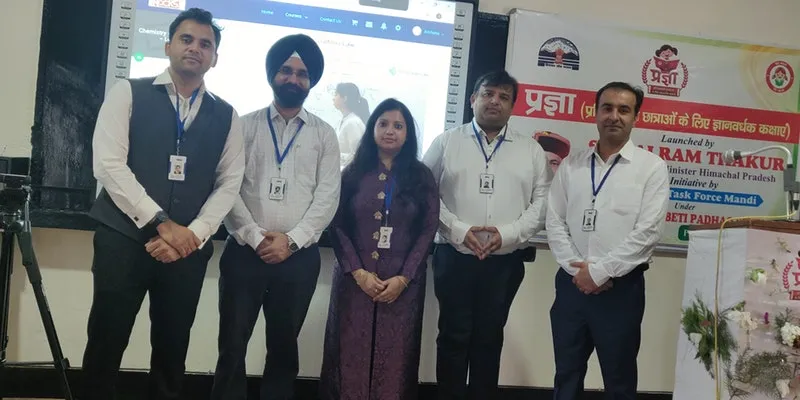How this startup scaled from local in-person tuitions to a blended edtech model
The edtech startup has made its mark in coaching services by integrating offline programmes with online modules and monitoring mechanism.
In recent years, Byju's has emerged a runaway success in India, displaying the powerful impact that technology can have on scaling and accessibility in education. What started off as an offline coaching service in 2006 is now synonymous with edtech in India.
Today, Edusquare is another startup that is making waves with its blended learning model for school students between kindergarten and Class XII. Founded in late-2014 by Deepak Goyal, Tejpreet Singh, and Sivia Goyal, the edtech startup blends app-based and offline learning.The team has adapted concepts from offline learning and technology-based education to make learning accessible and affordable for all.
According to Deepak, Co-founder and Managing Director, Edusquare:
“Since the existing offline solutions are focused mainly on the results of the few top students, those who don’t make the cut are left without any guidance. Also, many deserving meritorious students cannot travel or relocate to locations where major coaching players and expert faculties are. Due to the limited or lack of resources at their disposal, they end up missing the bus to IIT-JEE or NEET selection.”

Founders of Edusquare (L-R) Anand Arora, Tejpreet Singh, Sivia Goyal, Deepak Goyal, Piyush Chabbra
According to the Edusquare team, solutions such as those offered by Byju's and Vedantu do not integrate continuous monitoring.
“Also, with the high costs that they come with, it becomes almost impossible for students to gain value out of them,” explains Deepak.
Edusquare addresses these issues by blending technology with effective mentorship and discipline through its app as well as offline classroom programmes. It empowers local educators with its plug-and-play model of live classes and video lectures, ensuring two-way interactions and daily monitoring.
In the beginning
It all started in 2009 when Deepak, an IIT-Delhi computer science graduate, quit his job in Switzerland and got back to his roots. Deepak was keen on bringing a change to the education scenario in Ludhiana, which then lacked organised coaching services for IIT-JEE and other entrance exams. Knowing who he wanted on board with him for the new venture, he connected with Tejpreet, his best friend and an alumnus of the Management Development Institute, Gurugram. Not only did Deepak persuade Tejpreet to quit his MNC job, he also convinced his sister, Sivia, to put in her papers and join them.
Together, they started Aryabhatta Tutorials, a training centre for high school graduates looking to crack the competitive exams for undergraduate courses.
From those offline teaching days, the brand of Edusquare was founded in 2014 with the aim of becoming the market leader in coaching services in Ludhiana. Parag Arora, an IIT-Delhi graduate and a serial entrepreneur, joined the founding team in the same year.
In 2018, the founders were joined by Anand Arora, an IIT-Roorkee graduate with experience at PepsiCo, and Piyush Chhabra, a graduate from the University of Rochester and an edtech entrepreneur.
Together, the team developed a unique strategy to expand Edusquare’s presence in the offline education market with lean plug-and-play models. These solutions are made available to independent education entrepreneurs across the country and they will use an AI based app for student evaluation and mentorship.
Simply put, Edusquare runs students through offline and online modules as part of its coaching courses. The offline mode is primarily franchised and the app serves as after-tuition support for students.
Today, the startup has eight centres across North India, offering coaching in Mathematics and the sciences for middle and high school students. The solutions encompass coaching for medical and engineering entrance examinations too.
Their model and the market
Currently, the startup competes with offline players like FIITJEE and Aakash ALLEN, which are providing infra-heavy, big classroom-centric coaching programmes. This model is primarily successful in big cities and other hubs and caters to lakhs of students every year. Edusquare’s second form of competition comprises the online players like Vedantu and Unacademy.
Deepak adds that, at Edusquare, the method of delivery comprises live classes at centres and video lectures on the app to reinforce the daily curriculum. The content dissemination is backed by an AI-powered mentorship tool that has reached more than 5,000 people to date and solves queries in real time.
The challenges and solutions
One of the major difficulties for the business, in smaller cities especially, has been to build an acceptance for the online mode of learning. Another difficulty that Edusquare has faced is in reinventing the offline-cum-online coaching solutions, considering there have been multiple tried-and-tested models that haven’t received great response from students.
“Hence, gaining their trust with our unique offerings will require significant consumer education,” explains Deepak. They are going to focus more on spreading word of mouth through their offline centres and spend on digital marketing.
The team shares that their market penetration going forward will leverage the mobile app. They are also planning to on-board a larger ‘retailer’ network of schools, tuition centres, and other institutes to impart the platform’s ‘Educlass’ to students using the startup’s content, app, and coordination mechanism.
Deepak says, “Our key offerings are the mentorship app created by our in-house tech experts as well as our content powerhouse comprising our centres and trained faculties.”
The startup’s technology is built on a combination of platforms including Python, Flask, Angular JS, HTML5, CSS, JS, Flutter, and AWS for cloud computing.
Growth so far and for the future
With its bi-fold business model, Edusquare generates revenue from its offline centres (self-owned or franchises) and from providing its plug-and-play programme to coaching institutes, ranging from FFI’s or Full Fledged Institutes to small business owners. The other minor revenue stream is through in-app purchases.
According to the team, the company has been profitable since its third year of operations and is self-financed from revenues to date. It has ploughed back earnings of nearly Rs 6 crore into the business, Deepak says.
In the next 18 months, the startup plans to raise its first funding round and scale up from the existing nine centres to more than 20 across the country. The team also plans to develop an AI/ML-powered tool on the app to guide students to test them on the curriculum picked up from their online courses. They are targeting over five lakh app downloads in 18 months, with a significant part of the revenue coming through the online model.
The startup is also planning to leverage its government tie-ups in Punjab and Himachal Pradesh where free education is being imparted to meritorious students through initiatives like Beti Bachao Beti Padhao and MedhaviYojna.
Deepak adds,
“Students in these remote areas are now being trained and coached through our blended model of learning, which provides them expertise, extensive testing, analysis, and doubt-solving at their doorstep. They don’t have to travel outside their home, which ensures their safety and optimum utilisation of their time.”
(Edited by Athirupa Geetha Manichandar)










